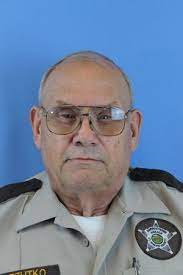Elkhart resident, targeted by racially motivated police, spent nearly 10 years in prison
Contributing Writer @beansouptimes
CHICAGO—In the fall of 1996, Keith Cooper was married with three children, he had two jobs and no criminal record. His life changed forever after he was targeted by a subgroup of Elkhart police officers who reportedly would “lie, cheat and defraud” to protect one another.
Cooper, 54, falsely charged and convicted of an October 29, 1996 robbery and attempted murder, would spend nearly 10 years in jail, eight of them in maximum security. While incarcerated, his family was forced to sell all their possessions and faced homelessness.
For damages he and his family suffered, Cooper will receive $7.5 million in a settlement with the city and former police officers involved in the investigation, announced his attorneys at an afternoon press conference May 4. It’s the largest wrongful conviction settlement ever in Indiana.
“Today is an incredible day for Keith and his family receiving monetary justice for every moment that he spent wrongfully incarcerated,” said Attorney Elliot Slosar of Loevy & Loevy law firm. “It is not lost that he will never get those days or years back. Nothing, no amount of money Elkhart could pay would give Keith true justice.”
Cooper was released from prison in 2006. In 2017 he became the first person in Indiana history to win a governor’s pardon based upon actual innocence.
“It’s been a long uphill battle. I’ve been waiting 14 years for this day and now it’s here,” Cooper said during the press conference. “There’s no amount of money that can get me back the time I lost. But it helps build a better tomorrow for me and my family.”

The City of Elkhart apologized for its handling of the Cooper case. City spokesperson Corinne Straight read a prepared statement at a separate press conference.
“We hope this settlement brings to a conclusion the obvious injustice that has been rendered to Mr. Cooper. The current administration and current leadership in the Elkhart Police Department have set upon a path of accountability in the hopes that this kind of case will never happen again,” the statement read in part. “To Mr. Cooper and his family, we regret the suffering you experienced.”
The record-breaking settlement follows a series of other wrongful conviction proceedings and lawsuits in Elkhart. The city exonerated Christopher Parish, Cooper’s co-defendant in the 1996 robbery and awarded him nearly $5 million in a 2014 settlement. In March, Andrew Royer filed a lawsuit saying police and prosecutors coerced him into a false confession. A handful of other cases against the Elkhart Police Department are pending, according to various reports.
Cooper’s fight for justice unearthed the existence of The Wolverines—a racially motivated subgroup of officers in the Elkhart Police Department that preyed upon Blacks and Latinos.
The name was inspired by a Reagan Era movie titled, “Red Dawn.” This Cold War film depicted a sudden invasion of the United States by communist nations led by the Soviet Union. As the summary of the plot states, they are ultimately defeated by a band of “American freedom fighters” led by a character played by actor Patrick Swayze who called themselves The Wolverines.
In the late 80s and early 90s the demographics of the city were changing and for these police officers, Blacks and Hispanics/Latinos were the “invaders.”
Elkhart, a city 110 miles east of Chicago has a population of less than 150,000 was a predominately White town but was rapidly growing with more Black and Latino residents. In the 1990 census, the White population of Elkhart was 93 percent. By 2000, the racial makeup of the city was roughly 70 percent White, 15 percent Black, and Hispanic or Latino of any race were 15 percent of the population.
The changing demographics of the United States was a big topic in the 1990s. There was even a Time Magazine cover story on April 9, 1990, titled “America’s Changing Colors.” The cover also asked the question, “What will the U.S. be like when Whites are no longer the majority?”
According to Loevy & Loevy, three of the four defendants in Cooper’s civil lawsuit have been implicated as members of The Wolverines. Additionally, Edward Windbigler, the recent Elkhart chief of police, now admits to being associated with the group.
The former chief of police, J.J. Ivory, testified that the officers would “lie,” “cheat,” and “defraud” in order to protect one another and prey upon people of color in the Elkhart community, reported the law firm.
“Keith Cooper was tragically framed for a crime he did not commit, and tragically, there are scores of additional Keith Cooper’s waiting for their chance at obtaining justice. This litigation exposed the systemic pattern of police and prosecutorial misconduct that exists in Elkhart, Indiana,” said Atty. Slosar.
The Elkart Police Department conducted two separate Internal Affairs investigations into Elkhart Detective Steve Rezutko based on allegations that he paid informants and witnesses in homicide investigations for sexual acts but refused to fire him.
A 2001 investigation discovered wrongdoing by Detective Rezutko. They recommended that he be terminated. Instead, the Elkhart Police Department and Elkhart County Prosecutor’s Office allowed Rezutko to testify in other criminal cases without disclosing this evidence to the defense, including Cooper’s case. When discovered, Cooper’s attorneys filed a motion to get more information concerning his wrongdoings. Rezutko committed suicide the night before he was to respond.
Cooper was convicted based on false testimony by a jail-house snitch and false eyewitness manipulated by Detective Rezutko. As Rezutko’s former supervisor put in a sworn statement, the detective “often put together extremely suggestive line-ups in order to push the witness towards his preferred suspect instead of letting the witness make an independent decision.”
The eyewitnesses against Cooper have since recorded video statements describing how they were manipulated by Rezutko. More sophisticated DNA testing conducted in 2002, five years after Cooper’s conviction, not only cleared Mr. Cooper of the crime, but pointed to a serial offender, Johlanis Cortez Ervin, who is now imprisoned in Michigan for a 2002 murder.
“Today, while we are celebrating this historic settlement for Keith and his family, and we embrace the kind words of the city of Elkhart and the mayor, we call upon the city administration to join us in requesting for the appointing of a special prosecutor, a prosecutor with integrity who will look into every single case that Steve Rezutko ever investigated or that any of the other defendants here have ever investigated, There are cases going on in Elkhart, right now, post-conviction issue using the same evidence that we developed in the civil lawsuit,” his attorneys noted.













